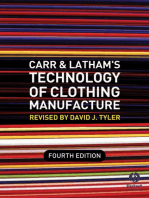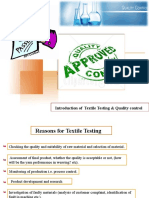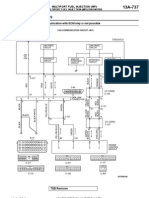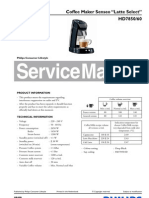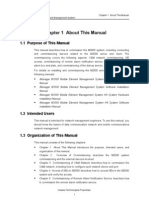Testalks: Textile Testing International
Testalks: Textile Testing International
Uploaded by
lthyaguCopyright:
Available Formats
Testalks: Textile Testing International
Testalks: Textile Testing International
Uploaded by
lthyaguOriginal Description:
Original Title
Copyright
Available Formats
Share this document
Did you find this document useful?
Is this content inappropriate?
Copyright:
Available Formats
Testalks: Textile Testing International
Testalks: Textile Testing International
Uploaded by
lthyaguCopyright:
Available Formats
Textile Testing Internationals Online Newsletter
Testalks
March-April Issue 2011
Textile Testing International
Your partner in textile Testing
www.ttilabs.net
Textile Testing Internationals Online Newsletter
COLORFASTNESS TIPs and TRICKs
By Ali Ashraf ( G.M Operations ) Textile Testing International
Preparation A Fabrics ability to retain its original color is one of the most important properties of a textile product. The colorfastness or color retention is influenced by a number of variables that occur both pre-consumer and postconsumer. Fiber Quality, yarn formation, fabric construction, textile wet processing and consumer practices can all have an influence on the performance characteristics of a fabric. Of these variables, the choices made during textile we processing have the most significant effect on the colorfastness properties. Dye selection is also of the utmost importance. On the other hand consumer practices such as detergent selection and laundering techniques also play a major role in the color retention of a fabric.
Preparation is the first stage of textile wet processing. A thorough removal of impurities (waxes, sugers, metals, processing aids, grease, plastic and rubber) always help to achieve optimum dyeing and finishing conditions. Dye Selection Dyeing is the crucial step in determining the colorfastness performance of a fabric. Every dye has a unique colorfastness property. The structure of the dye, the amount of dye, its method of bonding to the fabric and dyeing procedures all contribute to a dyes performance characteristics. Dye combination in a specific formulation must also be evaluated for their effect on colorfastness.
The AATCC has over thirty test methods that evaluate colorfastness properties. These include , but are not limited to wash, light , crock, dry cleaning, perspiration, abrasion and heat. The type of product being manufactured determines which types of colorfastness are important and therefore which test methods are relevant. For example, upholstery fabrics must have excellent lightfstness and crock fastness properties, whereas washfastness is important for clothing fabrics. Our experience at Textile Testing International suggests following as the textile manufacturing process affecting colorfastness;
Lets take Fastness characteristics for Cotton ( Table 1.0 )
Textile Testing Internationals Online Newsletter
Finishing Generally, resin treated fabrics demonstrate improved color retention to laundering. However, this increase in color retention comes at the expense of reduced physical properties of the fabric. Silicone Softeners incorporated into resin finish bath further improve retention for some fabrics. Also, enzyme treated fabrics show improved ability to maintain their original color and appearance after multiple home launderings.The degree of improvement from any of these finishing techniques is highly dependent on the individual dyes used in a particular formulation to achieve a given shade.
End User Detergent Selection and Wash Procedures.
The evaluation of the colorfastness properties of a product should reflect the consumer laundry practices. Some fabrics may fade a little when home laundered with standard detergent, but fabrics laundered with detergents containing activated bleach can show significant losses in color strength as determined by the sensitivity of the dye to those detergents. Detergents containing enzymes generally reduce the color change associated with home laundering by decreasing the fuzziness of a fabrics surface. Consumer practices such as washing cloths inverted, reducing the wash load size, adding softener to the final rinse and reducing the tumble dry time minimize the color loss.
Textile Testing Internationals Online Newsletter
Textile Testing International (Tti), forms a new relationship with James Heal for Laboratory expansion
During the recent IGATEX exhibition in Lahore, Pakistan, Mr Hamed Lateef, CEO of Tti, finalised a deal with James Heal, for the supply of their Elmatear2 tear strength tester, which helps to finalise and fulfil Ttis ambitious laboratory expansion plans. The Elmatear2 is a robust and durable digital tear testing instrument, boasting a wide range of innovative features, including: a higher capacity of 128 newtons, automatic pendulum weight detection and automatic zeroing, plus sophisticated controls to help simplify and accelerate routine tear testing.
The relationship between Tti and James Heal initially began in 2004 with an enquiry for HEALS Wascator, ICI Pilling Box and the Crockmeter. However, this relationship was further developed at the ITMA ASIA exhibition in Shanghai during June 2010.
with James Heal; with the help of a Technology Partner like them, we are always one step ahead in adding value to our customers products. This is an excellent example of how trade shows can be a successful tool for meeting with key industry decision makers. Simon Dakin, International Sales Manager at James Heal commented: We are delighted to have strengthened our relationship with Tti, and are equally pleased with the successful outcome of the IGATEX exhibition in Lahore. Together with our exclusive distributors in Pakistan, Al Ameen Trading Corp., based in Karachi, we felt the exhibition was a great platform for building new leads, showcasing our products and meeting with a wide variety of customers.
Mr Lateef while expressing his satisfaction with James Heal said:
Since our inception, Textile Testing International (Tti) has been continuously adding and upgrading its equipment to meet the ever demanding needs of the market. James Heal has always played a major role in providing world class instruments, consumables and service to Tti. Consequently, our latest laboratory expansion and technology upgrade is attributed to our close liaison
Textile Testing Internationals Online Newsletter
Journey of Tti
Compliance to Performance
By Tariq Maqsood (Manager QA & Continuous Quality Improvement) Textile Testing International
Textile Testing International (Tti) is a third party testing laboratory accredited against ISO/IEC 17025 by Pakistan National Accreditation Council (PNAC), offering the largest accredited testing scope in Pakistan. With the completion of the 2nd cycle of accreditation, we believe our systems and controls have become mature enough to facilitate consistent delivery of quality services to our valued customers. Within these two accreditation cycles, we strived for an uncompromising compliance to the requirements of ISO/IEC 17025 and international test methods, which helped us, go through last two assessments with distinctions (Zero Nonconformity). In order to strengthen our technical competence, we have been regularly participating in proficiency schemes offered by AATCC & ASTM and our performance was first-rate, which further helped, motivated and encouraged our technical
Team to deliver accurate and reliable test results. The best Part is that we are now not just stopping there. Our recent adaptation of quality tools & techniques like 5 S, Kaizen, productivity enhancement, Six Sigma is moving us one step ahead in compliance. We hope and are sure that our philosophy of avoiding stagnation by training our team on these quality tools rather then just entertaining documentary compliance would pave a path towards making our services better and more comfortable for our valued customers.
Textile Testing Internationals Online Newsletter
The Importance of selecting the right Textile Doctor
Turnaround time Cost $$$
ISO/IEC 17025 ISO/IEC 17020 CPSC Accredited
Accreditations
Global Recognition
Third-party
quality testing is important to the entire textile supply chain. Testing helps ensure textile products of consistent quality that meet brand/buyer specifications. The effective usage of test results acts as a tool to reduce wastages, provide corrective techniques, optimize production, and improve turnout time. Above all is the customers confidence, which can be enhanced along with a better market access for your products. But how do brands/buyers know which testing labs to trust, to show an accurate portrait of the quality of their products? Are they just supposed to go for a big name/multinational or there are other parameters which help you select you partner in testing?
Following are a few pointers: Laboratory Accreditations o ISO 17025 o ISO 17020 o CPSC Rapid Turnaround time Affordable rates NO compromise on Quality Participation in proficiency testing Interlaboratory comparisons State of the art testing equipments Consistent services Traceability / Reliability Prompt customer services Sample pickup service( No courier chargers ) Training of the technicians
Textile Testing Internationals Online Newsletter
The benefits of using a Local, but an Internationally Accredited laboratory
Every business service provider in the world has a vision to develop a competitive edge or in other words a competitive advantage for its sustainability. But what is Ttis success story even when the big cats are around? You can get this answer from any customer of ours. It is plain and simple. Every commercial accredited laboratory claims to be accurate and possess state of the art technology, every company claims to be the biggest in the business. But our story is different. A company which was made keeping in mind what was needed, Textile Testing International provides the fastest turnaround time possible at the most affordable cost. Because we believe cost does matter especially when its comes to companies who completely rely on testing without which their exports cant get market access. The fact that Tti has been rapidly growing in terms of its clientele, Our Accuracy and reliability speaks for itself. We would like to thank our valued customers for making us their partner in testing services.
The Be st Turnar ound T
Afford a
ble Ra tes
ime
Textile Testing International
a division of Total Testing Solutions Inc.
Your partner in textile Testing ISO/IEC 17025
Lahore:
137 A, Faisal Town Lahore 54500 TEL: (92-42) 111 786 001 FAX: (92-42) 517 6666
ISO/IEC 17020
Karachi:
3rd floor, Plot # 7C, Sunset Commercial Street # 1, Phase 4, DHA, Karachi 75500 TEL: (92-21) 111 786 001 FAX: (92-21) 580 0397
CPSC Accredited
Faisalabad:
LG, Lateef Tower, Off 200 meter Jaranwala Road, Khurrianwala, Faisalabad. TEL: (92-42) 111 786 001 FAX: (92-42) 517 6666
Prompt Services
io n t i n g o c e Global R
Reliab i
Traceability e m i t d n u o r a n r u T d Rapi ty i l a u Q n o e s i m o r p m o c No
lity
ADD VALUE TO YOUR PRODUCTS
You might also like
- Textile Testing Methods Based On ISO StandardDocument14 pagesTextile Testing Methods Based On ISO StandardMd Masum100% (6)
- Dormitory StandardsDocument9 pagesDormitory Standardssnow8villiers-180% (5)
- Audit Report NewDocument15 pagesAudit Report NewRoshna Haroon100% (1)
- Denim Fabric QualityDocument46 pagesDenim Fabric Qualityana5vitovich100% (1)
- Carr and Latham's Technology of Clothing ManufactureFrom EverandCarr and Latham's Technology of Clothing ManufactureDavid J. TylerRating: 4 out of 5 stars4/5 (1)
- Ashrae 110: An Introduction To Laboratory Fume Hood Performance TestingDocument19 pagesAshrae 110: An Introduction To Laboratory Fume Hood Performance Testingryu181189No ratings yet
- 1.4 Safety Cases and Safety ReportsDocument19 pages1.4 Safety Cases and Safety ReportsbangladragosNo ratings yet
- Capacity Planning-Operations Management ReportDocument30 pagesCapacity Planning-Operations Management Reportnafees39100% (2)
- Quality Certification in TextilesDocument12 pagesQuality Certification in TextilesSatish KulkarniNo ratings yet
- Quality CertificatesDocument7 pagesQuality CertificatesDhruveSainiNo ratings yet
- Apparel Quality Standard & Implementation PDFDocument125 pagesApparel Quality Standard & Implementation PDFRommel Corpuz100% (1)
- Introduction of Textile Testing Types, Objectives, Importance and Methods - Clothing IndustryDocument9 pagesIntroduction of Textile Testing Types, Objectives, Importance and Methods - Clothing Industryjesidassun100% (2)
- 7 Quality of TextilesDocument21 pages7 Quality of Textilessayeed.butexNo ratings yet
- Inspection Brochure 2015Document6 pagesInspection Brochure 2015Aabid MehmoodNo ratings yet
- Sandhya DummuDocument85 pagesSandhya DummuTejaswini SridharNo ratings yet
- Chapter 03- Testing for Apparel ProductDocument8 pagesChapter 03- Testing for Apparel Productsouravpurno.karNo ratings yet
- Textile Testing & Quality ControlDocument12 pagesTextile Testing & Quality ControlAshikur Rahman100% (2)
- TextiletestingqualitycontDocument43 pagesTextiletestingqualitycontMangalPandeyNo ratings yet
- What Is Textile Testing?Document5 pagesWhat Is Textile Testing?Shilpi PalNo ratings yet
- Textile Testing Guide: Understanding Fabric Checking Standards and Testing MethodsFrom EverandTextile Testing Guide: Understanding Fabric Checking Standards and Testing MethodsNo ratings yet
- Reasons For Textile Testing: In-House Textile Testing Lab Have Been Listed HereDocument2 pagesReasons For Textile Testing: In-House Textile Testing Lab Have Been Listed HereSajad AliNo ratings yet
- Textile TestingDocument49 pagesTextile TestingHappyness Diary Official100% (1)
- Azmera Final ResearchDocument40 pagesAzmera Final ResearchÄbřîśh Łìj MęŘãNo ratings yet
- Quality Testing of The Terry Towel and Its Assurance MsDocument6 pagesQuality Testing of The Terry Towel and Its Assurance MsPankaj vermaNo ratings yet
- AMQC UNIT 5Document6 pagesAMQC UNIT 5Aarthi ArumugamNo ratings yet
- Mill Qualification Program (MQP)Document3 pagesMill Qualification Program (MQP)shadow shadowNo ratings yet
- Assignment On Fabric Quality Control and TestingDocument57 pagesAssignment On Fabric Quality Control and TestingBayazid Bustami Shaun100% (3)
- Fabric Quality Analysis & Assurance: by Sourabh SashwatDocument19 pagesFabric Quality Analysis & Assurance: by Sourabh SashwatSourabh SashwatNo ratings yet
- Mag Final ReportDocument42 pagesMag Final ReportMuhammed Yasin100% (1)
- Quality Assessment System For TextilesDocument93 pagesQuality Assessment System For TextilesSahil SharmaNo ratings yet
- Fabric Quality Evaluation: Testing-Objective Method Inspection-Subjective MethodDocument32 pagesFabric Quality Evaluation: Testing-Objective Method Inspection-Subjective Methodrumman14No ratings yet
- Lec 24-26 Introduction To Textile LabDocument13 pagesLec 24-26 Introduction To Textile LabMujahid MehdiNo ratings yet
- Textile Testing & Quality Control-1Document27 pagesTextile Testing & Quality Control-1Mahima SinghNo ratings yet
- 1: Quality and Fabric Tesing: Nift CPT (Clothing and Production Technology)Document32 pages1: Quality and Fabric Tesing: Nift CPT (Clothing and Production Technology)Nikunj ChandakNo ratings yet
- Total Quality in Garment IndustryDocument5 pagesTotal Quality in Garment IndustryMuhammad AliNo ratings yet
- Shehwar QCTDocument17 pagesShehwar QCTumrahNo ratings yet
- Hit 301 Internship Report 2016Document91 pagesHit 301 Internship Report 2016BLESSWARD MUTSOTSONo ratings yet
- PNADN883Document45 pagesPNADN883Ummi UmairahNo ratings yet
- Quality Management in Textile IndustriesDocument4 pagesQuality Management in Textile IndustriesInternational Journal of Innovative Science and Research Technology67% (3)
- Effective Total Quality Management in Textile Dyeing IndustriesDocument3 pagesEffective Total Quality Management in Textile Dyeing IndustriesMd. Jakir HossenNo ratings yet
- Apparel Lecture1!Document10 pagesApparel Lecture1!Md Ahasan HabibNo ratings yet
- Material Testing: Ankur SaxenaDocument70 pagesMaterial Testing: Ankur SaxenaMehak B Arora50% (2)
- 4842 14211 1 PB PDFDocument18 pages4842 14211 1 PB PDFraiyanduNo ratings yet
- Scou 217 Manual T02Document24 pagesScou 217 Manual T02Linda SandobalNo ratings yet
- Corporate Profile - CompressedDocument12 pagesCorporate Profile - CompressedSoe Zar Ni KyawNo ratings yet
- AssignmentDocument7 pagesAssignmentKamran AhmedNo ratings yet
- Case Study Quality System Mangement NIBMDocument24 pagesCase Study Quality System Mangement NIBMajay100% (1)
- Quality Control-Notes Presentation - Chongeri Azaria Mikas Leather Dit MwanzaDocument81 pagesQuality Control-Notes Presentation - Chongeri Azaria Mikas Leather Dit MwanzaAzaria MikasNo ratings yet
- Importance of Textile TestingDocument10 pagesImportance of Textile Testingsyeda heebaNo ratings yet
- Kyambogo University: Faculty of EngineeringDocument15 pagesKyambogo University: Faculty of EngineeringOKIDI Thomas BecketNo ratings yet
- Inspections: Monitoring Quality at Every Stage of SupplyDocument4 pagesInspections: Monitoring Quality at Every Stage of Supplykamaluahmed100% (1)
- Quality Control System Using Simple ImplementationDocument11 pagesQuality Control System Using Simple ImplementationBhavya DiddeeNo ratings yet
- APPAREL QUALITY MANAGEMENTDocument23 pagesAPPAREL QUALITY MANAGEMENTaalvis2409No ratings yet
- Brotex Industries: M.A. Textile Brothers DyeingDocument32 pagesBrotex Industries: M.A. Textile Brothers DyeingMohammadRaza BinAmirNo ratings yet
- Final AssignmentDocument19 pagesFinal Assignmentshahid rizwanNo ratings yet
- PPTDocument33 pagesPPTMitPatel100% (1)
- Uso e Instalacion Hybrid MX6Document56 pagesUso e Instalacion Hybrid MX6PrimeraCompañíaSanFernandoNo ratings yet
- Industrial Report of AnlimaDocument96 pagesIndustrial Report of AnlimaShuvoRahaman100% (1)
- Apparel TestingDocument9 pagesApparel TestingAl AminNo ratings yet
- Lecture Sheet 1Document5 pagesLecture Sheet 1raselranamrkNo ratings yet
- Kohinoor Textile Mill LTD RawalpindiDocument41 pagesKohinoor Textile Mill LTD RawalpindiDiscord YtNo ratings yet
- FinalAssignmentDocument19 pagesFinalAssignmenthieucuibapNo ratings yet
- QC Catalog AATCC EnglishDocument40 pagesQC Catalog AATCC EnglishKunal ShingalaNo ratings yet
- Filters & Products For Compressors, Vacuum Pumps and Compressed AirDocument50 pagesFilters & Products For Compressors, Vacuum Pumps and Compressed AirKashif NadeemNo ratings yet
- Aatcc NewletterDocument52 pagesAatcc NewletterlthyaguNo ratings yet
- RE: Laboratories - General Requirements - Fume Hoods (Ventilation Systems)Document3 pagesRE: Laboratories - General Requirements - Fume Hoods (Ventilation Systems)lthyaguNo ratings yet
- Textile and Apparel LabelingDocument24 pagesTextile and Apparel LabelinglthyaguNo ratings yet
- Brochure Textile FR PDFDocument5 pagesBrochure Textile FR PDFlthyaguNo ratings yet
- Chapter 6.3 Redox EquilibriumDocument46 pagesChapter 6.3 Redox EquilibriumlthyaguNo ratings yet
- European Ban On Certain Azo DyesDocument6 pagesEuropean Ban On Certain Azo DyeslthyaguNo ratings yet
- Newton's Unfinished Business: Uncovering The Hidden Powers of Eleven in Pascal's TriangleDocument5 pagesNewton's Unfinished Business: Uncovering The Hidden Powers of Eleven in Pascal's TrianglelthyaguNo ratings yet
- En Standards Protective ClothingDocument25 pagesEn Standards Protective Clothinglthyagu100% (1)
- PT Programmes AATCCDocument42 pagesPT Programmes AATCClthyaguNo ratings yet
- Virat Kohli's Manner of BattingDocument5 pagesVirat Kohli's Manner of BattinglthyaguNo ratings yet
- Fibres To FabricDocument23 pagesFibres To FabricPallavi Luthra Kapoor100% (1)
- Presentation Fire ProceduresDocument21 pagesPresentation Fire ProcedureslthyaguNo ratings yet
- Maxx Durable BrochureDocument4 pagesMaxx Durable BrochurelthyaguNo ratings yet
- Pahs in Toys and Childcare Products: Survey of Chemical Substances in Consumer Products No. 114 2011Document41 pagesPahs in Toys and Childcare Products: Survey of Chemical Substances in Consumer Products No. 114 2011lthyaguNo ratings yet
- Newton's Binomial and Pascal's Triangle: N K N NDocument1 pageNewton's Binomial and Pascal's Triangle: N K N NlthyaguNo ratings yet
- Branding PDFDocument62 pagesBranding PDFredoxoncNo ratings yet
- Maxx Durable BrochureDocument4 pagesMaxx Durable BrochurelthyaguNo ratings yet
- Turkey TextileDocument37 pagesTurkey TextileGizachew ZelekeNo ratings yet
- Revised Syllabus Garment Finishing CheckingDocument7 pagesRevised Syllabus Garment Finishing CheckinglthyaguNo ratings yet
- Measurement Good Practice Guide: E Es Sttiim Ma Attiin NG G U Un NC Ce Errtta Aiin Nttiie Es S Iin N T Te Es Sttiin NG GDocument46 pagesMeasurement Good Practice Guide: E Es Sttiim Ma Attiin NG G U Un NC Ce Errtta Aiin Nttiie Es S Iin N T Te Es Sttiin NG GengrziaNo ratings yet
- IHS-3 Fire Safety Presentation JMDocument18 pagesIHS-3 Fire Safety Presentation JMlthyaguNo ratings yet
- Jsa Webstore Online PurchaseDocument2 pagesJsa Webstore Online PurchaselthyaguNo ratings yet
- The Uncertainty of MeasurementsDocument39 pagesThe Uncertainty of MeasurementslthyaguNo ratings yet
- pp9Document33 pagespp9lthyaguNo ratings yet
- Roaches Catalogue - enDocument56 pagesRoaches Catalogue - enlthyaguNo ratings yet
- Ta Astm-6083Document8 pagesTa Astm-6083lthyaguNo ratings yet
- Presentation Fire ProceduresDocument21 pagesPresentation Fire ProcedureslthyaguNo ratings yet
- Audi RS7 ConfiguredDocument7 pagesAudi RS7 ConfiguredCS_EE_PhotographyNo ratings yet
- BN 20Document5 pagesBN 20Justin FletcherNo ratings yet
- PIlot Operated Safety ValveDocument6 pagesPIlot Operated Safety ValveTrisha Salinas100% (1)
- GR00004300D 13aDocument186 pagesGR00004300D 13aEduardo Enrique Rojas ValenzuelaNo ratings yet
- BS en 13100-1-2000Document9 pagesBS en 13100-1-2000vgautambarcNo ratings yet
- 910 914 920-14A AEHQ8315-01 Specalog ENDocument36 pages910 914 920-14A AEHQ8315-01 Specalog ENVratislav Němec ml.No ratings yet
- Jis g34442004Document20 pagesJis g34442004Rois KhusumantoroNo ratings yet
- High Rise Building Fuel Systems 01 0Document11 pagesHigh Rise Building Fuel Systems 01 0eimrehNo ratings yet
- ISO-4624 Pull Test (2023)Document11 pagesISO-4624 Pull Test (2023)ChristopheNo ratings yet
- Protecciones Secundario SelectivoDocument9 pagesProtecciones Secundario Selectivoelectric104No ratings yet
- Spring Edge: HTTP API Documentation (Transactional SMS)Document14 pagesSpring Edge: HTTP API Documentation (Transactional SMS)Spring EdgeNo ratings yet
- Netsh Wlan Start HostednetworkDocument3 pagesNetsh Wlan Start HostednetworkM Nanda KumarNo ratings yet
- Bmi Ac400-2Document1 pageBmi Ac400-2timsar1357No ratings yet
- Hull in Aluminium Alloys, Design Principles, Construction and SurveyDocument54 pagesHull in Aluminium Alloys, Design Principles, Construction and SurveyTiago CruzNo ratings yet
- GB Statys - 200 600A Installation - ManualDocument50 pagesGB Statys - 200 600A Installation - Manualxuyen tranNo ratings yet
- PED Certification RequirementsDocument9 pagesPED Certification RequirementsJose Andres Berrojalbiz MorenoNo ratings yet
- E-Commerce Course OutlineDocument4 pagesE-Commerce Course OutlinePraful DagaNo ratings yet
- Huawei s9700 Series Switches DatasheetDocument42 pagesHuawei s9700 Series Switches DatasheetBahzadNo ratings yet
- Uec E704 Digital Image ProcessingDocument2 pagesUec E704 Digital Image Processingguna79No ratings yet
- Service Manual: Coffee Maker Senseo "Latte Select" HD7850/60Document11 pagesService Manual: Coffee Maker Senseo "Latte Select" HD7850/60Wendy Bakker100% (1)
- Rectangular Rubber BuffersDocument3 pagesRectangular Rubber BuffersGMT Rubber-Metal-TechnicNo ratings yet
- ASME Geometric Dimension Ing and Tolerance Professional CertificationDocument20 pagesASME Geometric Dimension Ing and Tolerance Professional CertificationPaul Anthony Red60% (5)
- 01 - M2000 Commissioning GuideDocument110 pages01 - M2000 Commissioning GuidePham Thanh ChungNo ratings yet
- Citywide School and Playground Zone Sign Issues in WinnipegDocument11 pagesCitywide School and Playground Zone Sign Issues in WinnipegChristian SwerydaNo ratings yet
- Emms-As enDocument41 pagesEmms-As enOvidiu SandaNo ratings yet
- International Standard: Steel For The Reinforcement of Concrete - Ribbed BarsDocument11 pagesInternational Standard: Steel For The Reinforcement of Concrete - Ribbed BarsInce OnderNo ratings yet
- Navigating Through The Corporate DNADocument30 pagesNavigating Through The Corporate DNARandy PaderesNo ratings yet




